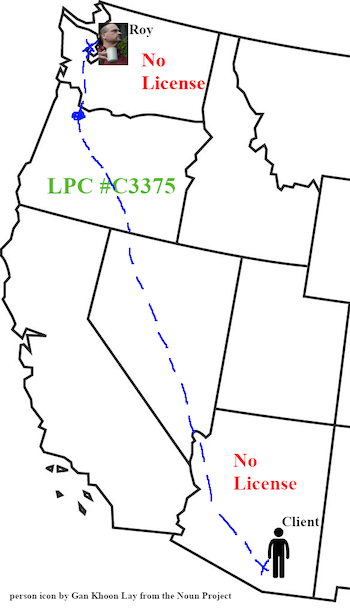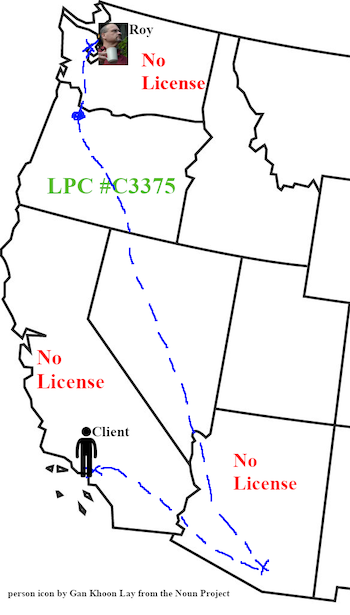
Photo by Deanna Ritchie on Unsplash
You probably know that if a client leaves the state where you’re licensed, you can’t (legally) just fire up the ol’ computer machine and see them over the Internet willy-nilly. Telehealth across state lines is a sticky issue.
But what if you, the therapist, leave the state? Can you work with your clients back home in the state where you’re licensed?
Even better: what if you both leave the state where you’re licensed? Will a session work legally in that case?
Exploring these scenarios lets us get past the usual-and-not-quite-accurate statement, “Therapists cannot legally do cross-state practice,” and look at the issue of multi-jurisdictional practice more accurately and objectively.
Let’s get into it.
A Complicated-But-Realistic Scenario
Let’s start with the complicated picture and work our way back.
But first, an important note: I’m going to talk about some state laws in this article. Please, please be aware that these references are for illustration only. If you wish to act on this info, you will need to make sure you research and accurately understand the relevant laws as they apply to your practice circumstances. Don’t be afraid to lawyer up when you need to.
Let’s say that I have a counseling client, whose name is Client (their parents weren’t very creative.) We work together in-person at my office in Portland, OR. I am licensed in Oregon and only in Oregon.
Client decides to get out of the chilly Pacific Northwest and visit family in sunny Tucson for the holiday season. I am not quite so smart, and I decide to go north to visit family in misty Seattle for the season.
Client doesn’t want to skip their counseling while we’re both out of Oregon, so they ask to do a session via videoconferencing during the break. Can we legally make this work?
Here is a handy diagram to help you visualize:

Roy and Client live in Portland. Client travels to Tucson while Roy travels to Seattle. Roy is not licensed in either Washington or Arizona. Can they legally do a session together?
Which state gets to decide if this is legal?
The technically true answer: All of them!
The likely-to-be-more-practical-answer: All of them, but Arizona and Oregon are most likely to have something to say about it.
To find the answers I need, I did what we teach students to do in our Telemental Health Certificate Program. I pulled out the telemental health laws app published by Epstein, Becker, Green! And I used it to help me find the current statutes in each state where I need information.
If the Oregon rules prohibit practice while the client of a licensee is out of state, or if they prohibit it while I (the licensee) am out of state, then our session won’t be legal.
Fortunately, the Oregon rules do not prohibit either of those things (so long as I am obeying the laws of the other jurisdictions involved.) In fact, it is our experience that such a prohibition is rare among US states. (But once again — make sure you research for yourself before acting on this information. The PCT team is good, but we’re not omniscient.)
If the Arizona state licensing board requires that I be an Arizona-licensed counselor to work with people in their state, then this won’t be legal. What’s more, if they don’t allow the counselor to be out of state during a session, then this won’t be legal.
Fortunately, my research shows that Arizona is generous with out-of-state counselors and their clients. I am allotted a limited amount of time each year to work with people in Arizona based on my Oregon license. The particular details of this kind of temporary practice provision is an exercise left to the reader (see our course on cross-border practice for help.) Suffice to say, I am satisfied that Arizona views this session as okay by them (so long as I also follow the additional telehealth practice laws that I discovered Arizona has…)
And how about Washington? I am physically present there during the session, so they certainly could have a say about the legality of this session if they wished. I haven’t been able to find any evidence that they do say anything about it, though. Given that I am not licensed there, and the client is not present there during the session, I will look at that fact and accept any risk that the state would object to my performing this session while inside their borders.
What if the client goes somewhere besides Arizona?
Okay, let’s imagine that Client takes a side trip to Los Angeles for some beach time. They ask to do another session while there. Let’s look at that.

After the above scenario completes, Client takes a trip to Los Angeles.
I’m not licensed in California, just like I wasn’t licensed in Arizona.
My research shows me that California will not permit me to practice there without being explicitly licensed by them. So I have to decline Client’s request and schedule for after they return to Portland (or, perhaps, Tucson.)
This is an interesting illustration, because my research indicates that I would be permitted some temporary practice time in California if I were a Psychologist. But I am a Professional Counselor, and our rules are different. C’est la vie. ¯\_(ツ)_/¯
The Simpler Scenario
So what about the original scenario, where I go out of state on a trip but Client remains in Oregon?
We probably don’t need a picture for this one, now that we’re used to the more complicated scene. We already know that Oregon doesn’t restrict me from working from outside the state, so long as I am obeying the laws of other applicable jurisdictions. And I’m licensed in Oregon, so I can certainly work with my clients who are located there.
The remaining question is one of the rules in the state(s) where I travel. While states (and nations) rarely object to this scenario, they could object if they wished. So for each jurisdiction I wish to work from, it would behoove me to perform some due diligence regarding the rules there.
Other Considerations
Besides jurisdictional issues, there are other issues that arise when doing telemental health while on the go (or when the client is on the go.) This article is long enough as it is, however. All those issues, and many more, are explored in our Telemental Health Certificate Program.
Happy travels!

